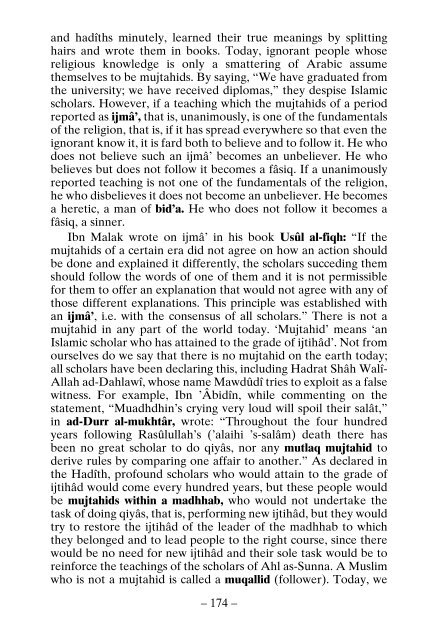Islams Reformers
The bigotry of the religion reformers or bigots of science who surfaced lately to blame all previous scholars, basic fundamental beliefs or practices
The bigotry of the religion reformers or bigots of science who surfaced lately to blame all previous scholars, basic fundamental beliefs or practices
Create successful ePaper yourself
Turn your PDF publications into a flip-book with our unique Google optimized e-Paper software.
and hadîths minutely, learned their true meanings by splitting<br />
hairs and wrote them in books. Today, ignorant people whose<br />
religious knowledge is only a smattering of Arabic assume<br />
themselves to be mujtahids. By saying, “We have graduated from<br />
the university; we have received diplomas,” they despise Islamic<br />
scholars. However, if a teaching which the mujtahids of a period<br />
reported as ijmâ’, that is, unanimously, is one of the fundamentals<br />
of the religion, that is, if it has spread everywhere so that even the<br />
ignorant know it, it is fard both to believe and to follow it. He who<br />
does not believe such an ijmâ’ becomes an unbeliever. He who<br />
believes but does not follow it becomes a fâsiq. If a unanimously<br />
reported teaching is not one of the fundamentals of the religion,<br />
he who disbelieves it does not become an unbeliever. He becomes<br />
a heretic, a man of bid’a. He who does not follow it becomes a<br />
fâsiq, a sinner.<br />
Ibn Malak wrote on ijmâ’ in his book Usûl al-fiqh: “If the<br />
mujtahids of a certain era did not agree on how an action should<br />
be done and explained it differently, the scholars succeding them<br />
should follow the words of one of them and it is not permissible<br />
for them to offer an explanation that would not agree with any of<br />
those different explanations. This principle was established with<br />
an ijmâ’, i.e. with the consensus of all scholars.” There is not a<br />
mujtahid in any part of the world today. ‘Mujtahid’ means ‘an<br />
Islamic scholar who has attained to the grade of ijtihâd’. Not from<br />
ourselves do we say that there is no mujtahid on the earth today;<br />
all scholars have been declaring this, including Hadrat Shâh Walî-<br />
Allah ad-Dahlawî, whose name Mawdûdî tries to exploit as a false<br />
witness. For example, Ibn ’Âbidîn, while commenting on the<br />
statement, “Muadhdhin’s crying very loud will spoil their salât,”<br />
in ad-Durr al-mukhtâr, wrote: “Throughout the four hundred<br />
years following Rasûlullah’s (’alaihi ’s-salâm) death there has<br />
been no great scholar to do qiyâs, nor any mutlaq mujtahid to<br />
derive rules by comparing one affair to another.” As declared in<br />
the Hadîth, profound scholars who would attain to the grade of<br />
ijtihâd would come every hundred years, but these people would<br />
be mujtahids within a madhhab, who would not undertake the<br />
task of doing qiyâs, that is, performing new ijtihâd, but they would<br />
try to restore the ijtihâd of the leader of the madhhab to which<br />
they belonged and to lead people to the right course, since there<br />
would be no need for new ijtihâd and their sole task would be to<br />
reinforce the teachings of the scholars of Ahl as-Sunna. A Muslim<br />
who is not a mujtahid is called a muqallid (follower). Today, we<br />
– 174 –

















